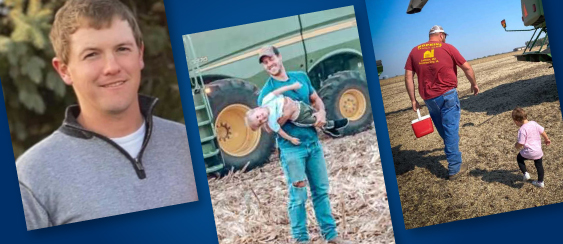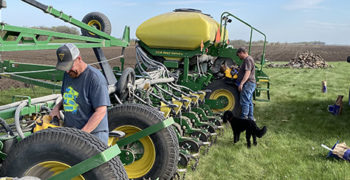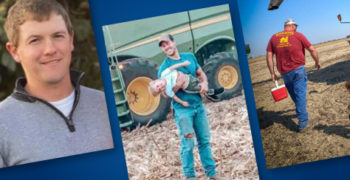With one-third of U.S. farmland expected to change hands in the next 15 years, young and beginning farmers are urgently needed.
But these new farmers have plenty of obstacles to navigate. With increasingly high cash rent rates, land values selling at historically high prices and expensive machinery costs, not having confidence and ease-of-mind with their seed company shouldn’t be another thing on their plate.
Beginning farmer obstacles
“It’s difficult to dollar-cost average acres and equipment when you’re just getting started,” says Lucas Bravard, a Greene County, Iowa corn and soybean farmer and hog producer. “The biggest thing in my neighborhood is how hard it is to be competitive when you just don’t have the acres or equipment the older guys do.”
Bravard began farming full time in 2015 and diversified with custom feed hogs in 2016. He became a Champion customer in 2017. The central-Iowa farmer says market volatility has been a struggle in those years, which makes starting out more challenging.
“Every year is different, some years it’s bad yields with good prices and some years we’ve got good yields with bad prices,” says Bravard. “I like this year best – good yields and good prices.”
For Giltner, Nebraska farmer Logan Rath, continuing his family legacy and improving his farm each year is his priority. The 6th generation farmer began in 2017 and says the learning curve was his biggest challenge. “My Dad farmed alone and I helped him out as a high schooler, but when you realize you’re supposed to go plant a million-dollar cash flow it gets real very fast” says Rath, who came from Pioneer to Champion in 2018.
The southern-Nebraska farmer recalls the difference of hauling in corn for $3.20/bushel his first year of farming compared to this year’s $7.00/bushel, albeit coupled with sky-high fertilizer costs. “It’s a struggle,” says Rath. “It seems we’re always feast or famine.”
Championing young farmers
Bravard and Rath eventually became Champion dealers, a venture that allows them an additional source of income in the never-ending quest to be more competitive.
“I met Brett and Seth (Champion Seed owners) as well as both lead agronomists and thought ‘there’s a really good dynamic going on here’,” shares Bravard. “My Dad and I have always planted what we felt best suited our operation, but the more we worked with Champion, the more we saw value in their people and products.”
For Maryland-transplant Justin Hopkins, Champion Seed was a familiar face as the sponsor of the Western-Series Tractor Pull he competes in. The southern-Iowa corn and soybean grower, and cow-calf producer switched his seed hat in 2016 and became a dealer in 2019.
His family farms in Maryland and Justin began farming in Iowa in 2004. The 5th generation farmer says land acquisition has been the biggest challenge.
“Where I’m from in Maryland, Hopkins is a good name and we’re well known,” he shares. “But here in southern Iowa, we’re a small fish in a big pond and have to build a brand for ourselves.”
Hopkins says Champion’s relentless pursuit of better genetics is what caught his attention, but the accessibility and transparency he’s experienced is what keeps him around. The young farmer also spends ample time on Champion’s website, reviewing plot data and the field-by-field yield results.
“Champion doesn’t have any ‘old’ genetics,” he says. “It seems they never stay satisfied with what they have and are always looking for something better. And they’re the only seed company I know that will actually tell me if a hybrid has a weak spot.”
Even if a hybrid has performed consistently well, Hopkins believes each one has a weakness. Even if a seed has 9 out of 10 good traits, Hopkins says Champion is up front about the weak link.
Bravard agrees with Hopkins, that top-notch hybrids help the young farmers be more competitive.
“Champion Seed is focused on putting out the best genetics specifically for Iowa and surrounding states’ soils,” says Bravard. “I’ve seen some companies trying to string different hybrids coast to coast, but we focus on our farms closer to home.”
As Bravard and Hopkins navigate their beginning farming careers, top-of-the-line genetics at Champion Seed makes being competitive a little easier.
Family vibes and future advice
Rath values Champion’s accessibility and says being able to talk directly with the owner gives him a leg up on planting knowledge.
“They’re large enough to have excellent genetics, traits and services,” Rath shares. “But they’re small enough that you can talk with the owners any time. It’s a family company vibe with the products of an industry-leading provider.” This accessibility is a core value at Champion Seed, where access to ownership will always remain top priority no matter how much they grow.
Bravard says there’s been times he’s chosen to change a hybrid last minute and Brett or Seth has delivered seed right to his shop – an advantage he believes helps planting season keep an efficient pace.
The three young farmers say finding a seed company that is competitive, service-minded and has people who are enjoyable to work with are key in helping weather the storms of agriculture — especially as young farmers. The three are also a prime example of the Champion model: starting by old-fashioned personal conversations and a few seed bags in year one, to ultimately switching brand of hats to Champion Seed.
Their advice to other young farmers?
“It’s okay to take chances,” says Bravard. “Being aggressive in agriculture has turned out to be a very good thing since I started.”
For Rath, balancing instincts and experience is critical. “Learn to walk the line between trusting an instinct but not being too sure of yourself,” he shares. “I’ve had a lot of experiences where I thought I knew what I was doing, but I ended up being wrong.”
And for Hopkins, he reminds other farmers why they’re all farming in the first place. “Don’t give up on your dreams, just do the best you can every day.”
For young or beginning farmers interested in learning what Champion Seed traits and services can do, and to see yield results down to the county level, visit plantchampion.com/yield-results.



